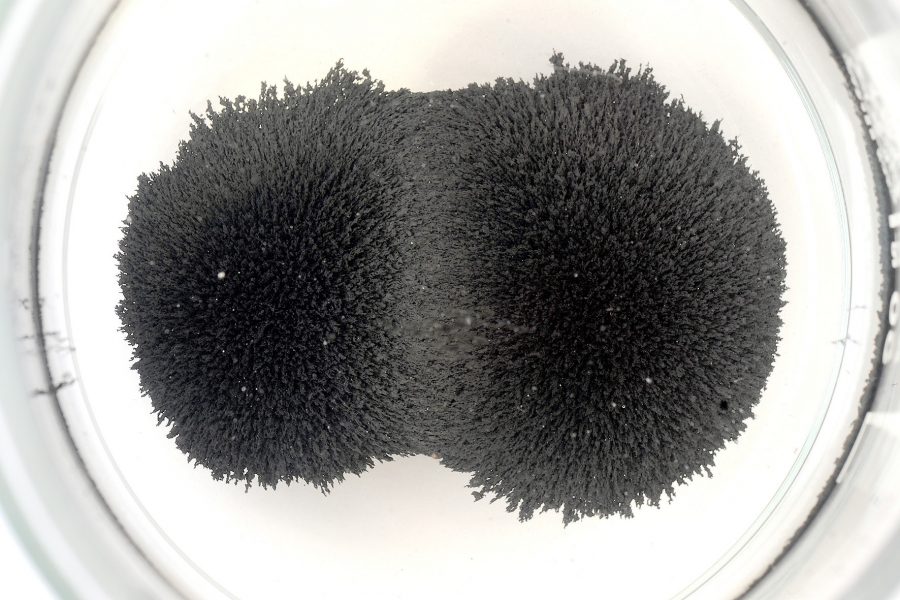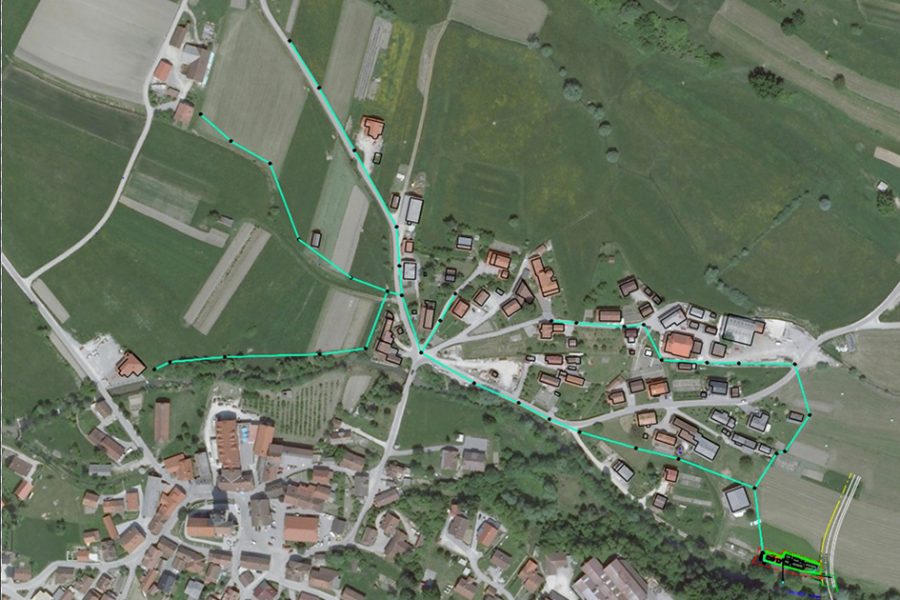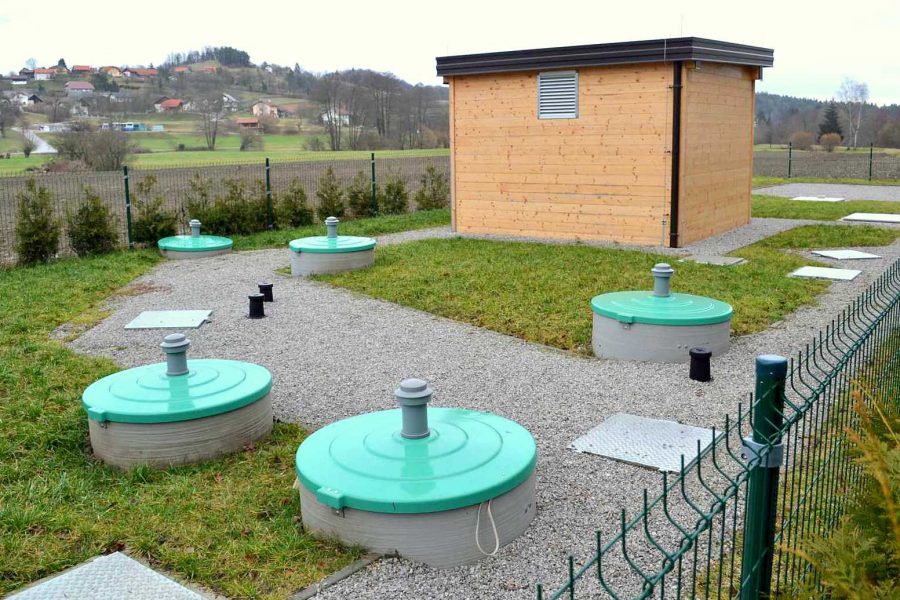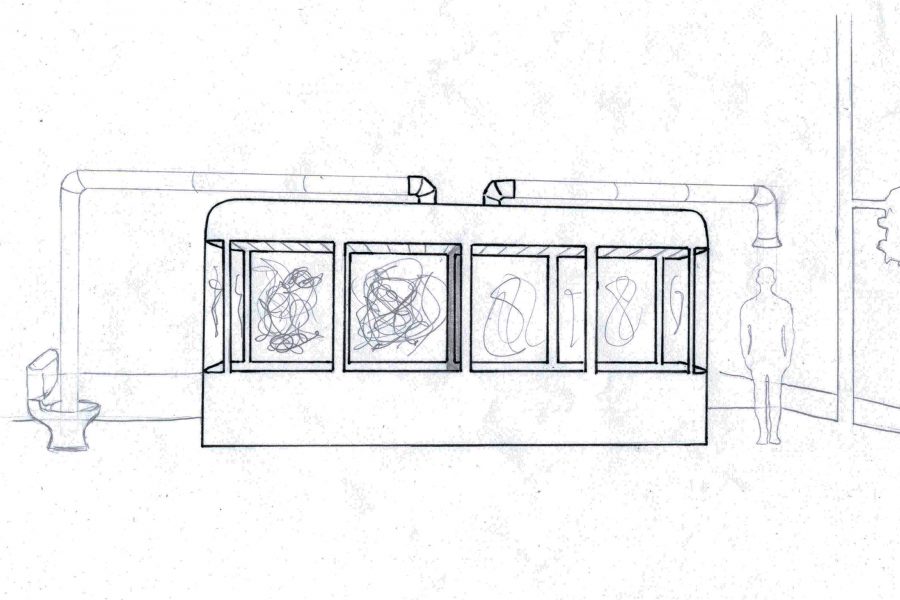The exhibition in Mitnica, the exhibition pavilion of the Faculty of Natural Sciences and Engineering and the Institute for construction of Slovenia, and its Conservation centre of modern and contemporary art, is a metaphorical review of the RusaLCA project that is based on improved handling of water resources. These resources are ever further threatened by climate change, pollution and population growth. The Institute for construction of Slovenia in collaboration with its partners has developed a method, using a small biological treatment plant with nanotechnology to further refine water purification with the purpose of reusing and repurposing it. This would enable a drastic reduction in the use of drinking water from natural resources for secondary uses.
Students were confronted with the growing threat of dwindling drinking water resources when they studied the purification and circulation of water. They took particular interest in the research process, from the refinement methods, materials and tools, to water itself and its properties and its intrinsic importance.
In the experimental part of the project a cotton fabric was dyed with black tea extract prepared in a steam bath to exude maximal amounts of tannins from the tea. The fabric was submerged in this bath and left to dye for a number of days. After the colouring process iron sediment from a purification plant was used as a mordant to achieve darker shades of colour.
Deni Pregelj, Gašper Gajšek, Karmen Hočevar, Katarina Marija Kmet, Uroš Topić, Sara Grižon, Ela Vehovec, Tina Dovjak, Sara Jankovič, Dominika Rozina, Barbara Sušnik, Tina Crnkovič, Monika Ivanuša, Nina Žnidaršič, Karin Gosenca, Mia Matić, Marjetka Lucija Prelog, Eva Primec, Irena Višnar, Vita Rau, Urška Medved, Neža Dobrovoljc, Ula Pogorevčnik, Agnieszka Koraldy, Aditi Sakura and Gauri Nagpal, students of textile and fashion design were guided by mentors doc. dr. Ana Mladenović, Primož Oprčkal, mag. Mateja Golež, prof. Marija Jenko, doc. dr. Marija Gorjanc, and technical assistant Marjeta Čuk, to transform the entire pavillion into a symbollical purification plant where dirty textile waste is transformed into a clean, white, substance. In doing so it raises attention to the problem of environmental damage, with focus on water resources.
This exhibition is one of many performances taking part during the Days of European cultural heritage, this year focusing on Water – from myth to architecture. The exhibition was also spurred on by the 25th Biannual of industrial design in Ljubljana – with the title Faraway, so close; and was placed among the associated projects for this year.
Thoughts about watter…
______________________________________________________________________________________________________________________________________
One of the biggest things about water that one doesn’t really realize is the privilege of having water and the privilege of not even having to think of having water.
Najpomembnejše o vodi je, da se ne zavedamo, kako velika razlika je med “imeti vodo” in “niti pomisliti ne na to”.
Gauri Nagpal, Indija
______________________________________________________________________________________________________________________________________
…it’s such a necessity but it is also such a luxury and that luxury comes with such a privilege that is often ignored and to be able to recognize that is something really, really important.
… voda je nuja, je pa tudi razkošje in to razkošje je privilegij, ki ga pogosto kar prezremo, kaj šele, da bi se resnično zavedali, kako pomemben je.
Gauri Nagpal, Indija
______________________________________________________________________________________________________________________________________
…and it’s really sad to see how a necessity becomes just privilege and no one can survive without water. How long can you go without water? You can’t possibly, but it becomes a luxury and that is a really sad thing for us to see. You know, you just flush down drinking water and people don’t have any to drink.
… še bolj žalostno pa bo, ko bo ta privilegij postal le beseda na papirju in nihče ne bo preživel, ker vode več ne bo. Kako dolgo lahko zdržimo brez vode? Nikakor ne moremo in pretresljivo je gledati, kako je čista voda dostopna le nekaterim, ki s pitno vodo spirajo celo svoja stranišča, medtem ko drugje nimajo vode niti za pitje.
Gauri Nagpal, Indija
______________________________________________________________________________________________________________________________________
Sooner or later, we will have to recognize that the Earth has rights, too, to live without pollution. What mankind must know is that human beings cannot live without mother Earth, but the planet can live without humans.
Slej kot prej bomo spoznali, da ima tudi Zemlja pravico obstajati brez onesnaževanja. Človeštvo mora spoznati, da ne more preživeti brez matere Zemlje, planet pa brez njega lahko.
Evo Morales, Bolivija
______________________________________________________________________________________________________________________________________
Ljudje, ki živijo v pomanjkanju vode, imajo na izbiro tri stvari: da se prilagodijo, ostanejo, trpijo in umrejo ali da se preselijo oziroma migrirajo v kraje, kjer upajo na lažji dostop do osnovnega življenjskega vira. Ravno ta preseljevanja danes predstavljajo največji svetovni problem, saj je prestopil vse meje in danes zaobjema tako socialni, ekonomski, kulturni kot, na vso žalost, tudi vojaški problem.
Monika Ivanuša, Slovenija
______________________________________________________________________________________________________________________________________
Onesnaževanje vode je večja tragedija, kot si sploh lahko predstavljamo. Onesnaževanje je umor. Če želimo kaj spremeniti, moramo začeti pri sebi.
Eva Primec, Slovenija











